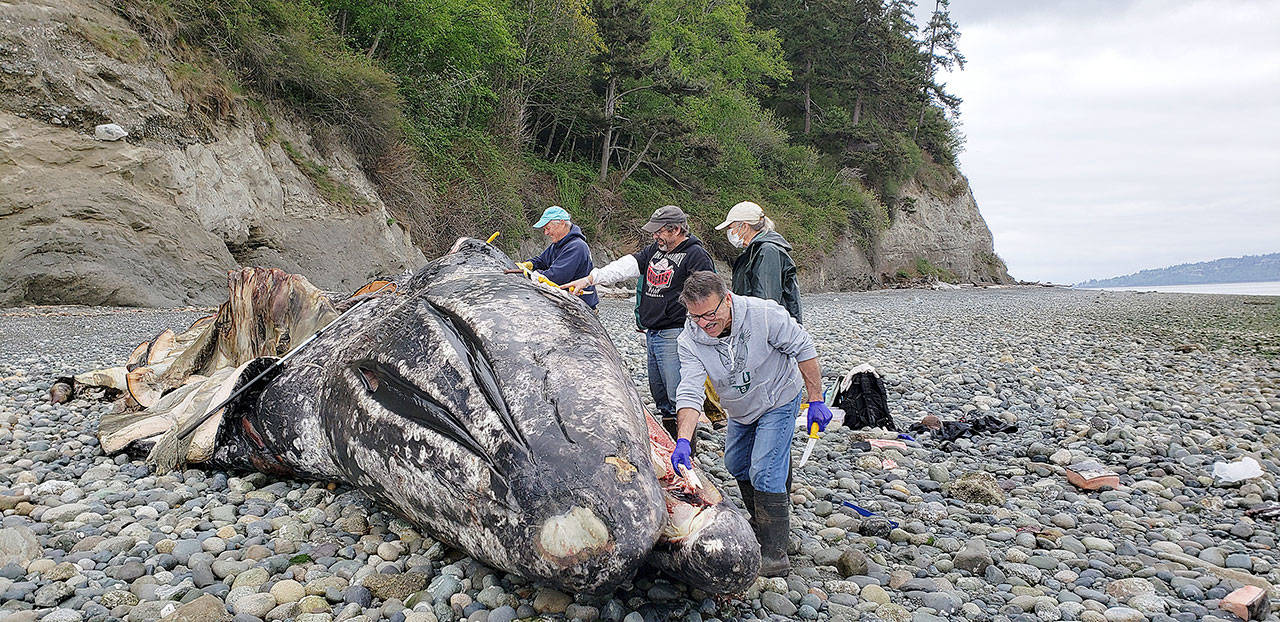When a massive carcass of a gray whale washes up on Puget Sound shores, it’s towed to a less-populated area to decompose in peace. Whidbey residents, however, were not exactly at peace with the odor and sight of rotting whale flesh after one was deposited near public-access beaches at Possession Point State Park.
Island County Commissioner Helen Price Johnson wants to make sure that more bloated bodies don’t end up on populated Whidbey beaches in the future as the number of deceased gray whales in Puget Sound skyrockets.
“I think it’s a big deal,” Price Johnson said at a commissioners’ work session Wednesday.
In April, an emaciated adult male washed up in the Seattle area and was then towed to Whidbey for a necropsy, according to Cascadia Research Collective. After researchers are finished collecting samples to determine the cause of death, the blubbery body was left to naturally decompose.
Price Johnson said in an email that she received a call from a woman who lives nearby and described “a terrible odor” and voiced concern over its location. About a month later, the whale seems to have washed back out to sea, she said.
The number of gray whale deaths in Washington state has already exceeded the total for 2018, well before the peak “season” for grays to be in the Puget Sound area, The Crosscut reported. With the likelihood that more bodies might show up, Price Johnson is trying to get local governments involved in the process deciding where to bring them.
Sinking whales requires a costly ocean dumping permit from the Environmental Protection Agency.
During a discussion Wednesday, Commissioner Jill Johnson joined Price Johnson in confusion over this requirement.
“We don’t issue death permits for those whales that are just out in the Pacific Ocean and decide to die,” Johnson said.
Price Johnson shared her whale-disposal concerns with state Rep. Norma Smith, R-Clinton, who held a conference call Wednesday among the Island County commissioner, representatives from state agencies that make up the Marine Mammal Stranding Net-work and the National Oceanic and Atmospheric Administration.
Price Johnson said she learned there is a list of beaches where whales can be necropsied and disposed of, based on criteria that is supposed to minimize impacts on local residents. Possession Point State Park was not on the list of allowable sites, she said.
Another Island County site on Camano Island that was recently used for another whale body was on this list.
Scientists said most of the dead grays appear to be malnourished and unable to make the annual migration from Baja, Mexico to the Arctic, Crosscut reported. Some experts think the increasing overall population of the animals is contributing to the deaths, but there are also concerns they are a sign of declining quantity and quality of food.
The baleen whales feed on arthropods, which reside at the bottom of the food chain.
In anticipation of a growing issue, Price Johnson said she’s trying to collaborate with agencies to ensure Island County residents are not stuck with giant, smelly carcasses near their houses or public recreational areas.
“I have suggested that local government should be included in the site selection process in the future,” she said.



